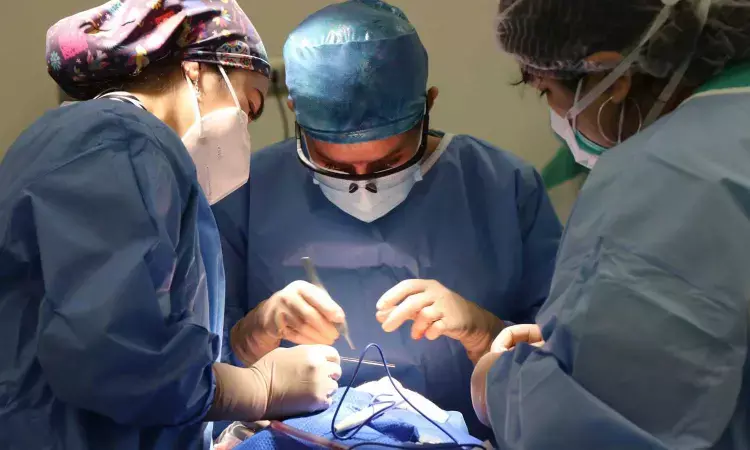- Home
- Medical news & Guidelines
- Anesthesiology
- Cardiology and CTVS
- Critical Care
- Dentistry
- Dermatology
- Diabetes and Endocrinology
- ENT
- Gastroenterology
- Medicine
- Nephrology
- Neurology
- Obstretics-Gynaecology
- Oncology
- Ophthalmology
- Orthopaedics
- Pediatrics-Neonatology
- Psychiatry
- Pulmonology
- Radiology
- Surgery
- Urology
- Laboratory Medicine
- Diet
- Nursing
- Paramedical
- Physiotherapy
- Health news
- Fact Check
- Bone Health Fact Check
- Brain Health Fact Check
- Cancer Related Fact Check
- Child Care Fact Check
- Dental and oral health fact check
- Diabetes and metabolic health fact check
- Diet and Nutrition Fact Check
- Eye and ENT Care Fact Check
- Fitness fact check
- Gut health fact check
- Heart health fact check
- Kidney health fact check
- Medical education fact check
- Men's health fact check
- Respiratory fact check
- Skin and hair care fact check
- Vaccine and Immunization fact check
- Women's health fact check
- AYUSH
- State News
- Andaman and Nicobar Islands
- Andhra Pradesh
- Arunachal Pradesh
- Assam
- Bihar
- Chandigarh
- Chattisgarh
- Dadra and Nagar Haveli
- Daman and Diu
- Delhi
- Goa
- Gujarat
- Haryana
- Himachal Pradesh
- Jammu & Kashmir
- Jharkhand
- Karnataka
- Kerala
- Ladakh
- Lakshadweep
- Madhya Pradesh
- Maharashtra
- Manipur
- Meghalaya
- Mizoram
- Nagaland
- Odisha
- Puducherry
- Punjab
- Rajasthan
- Sikkim
- Tamil Nadu
- Telangana
- Tripura
- Uttar Pradesh
- Uttrakhand
- West Bengal
- Medical Education
- Industry
Minimally Invasive Debridement effective in Early Management of Deep Second-Degree Facial Burn Wounds: Study

Minimally Invasive Debridement effective in Early Management of Deep Second-Degree Facial Burn Wounds suggests a study published in the BMC Surgery.
This study aimed to evaluate the therapeutic efficacy of minimally invasive dermabrasion for deep second-degree facial burn wounds during the early postburn phase.
A total of 35 patients with deep second-degree facial burns underwent minimally invasive debridement using a hydrosurgery system within 2–4 days post-injury. Subsequently, the wounds were covered with human biological dressings.
The wound infection rate, healing time, and overall healing quality following debridement were monitored. Result: In this cohort of 35 patients, no infections were reported after debridement. The average healing time for these wounds was significantly shorter than that of those treated with standard surgical excision. Clinical observations indicated that minimally invasive dermabrasion was associated with a lower infection rate and reduced healing time. After 6 months, scar assessment using the Vancouver Scar Scale showed that the average score for wounds treated with minimally invasive techniques was lower than those treated with standard surgical excisional technique.
This research indicates that minimally invasive debridement during the early postburn stage can effectively reduce wound infection rates, shorten healing times, and minimize the occurrence of scar hyperplasia and contracture deformities. Therefore, minimally invasive dermabrasion is valuable in treating deep second-degree facial burn wounds.
Reference:
Zhang, C., Li, Z., Zhang, Q. et al. Application of minimally invasive debridement for deep second-degree facial burns in the early postburn phase. BMC Surg 25, 17 (2025). https://doi.org/10.1186/s12893-024-02678-8
Dr. Shravani Dali has completed her BDS from Pravara institute of medical sciences, loni. Following which she extensively worked in the healthcare sector for 2+ years. She has been actively involved in writing blogs in field of health and wellness. Currently she is pursuing her Masters of public health-health administration from Tata institute of social sciences. She can be contacted at editorial@medicaldialogues.in.
Dr Kamal Kant Kohli-MBBS, DTCD- a chest specialist with more than 30 years of practice and a flair for writing clinical articles, Dr Kamal Kant Kohli joined Medical Dialogues as a Chief Editor of Medical News. Besides writing articles, as an editor, he proofreads and verifies all the medical content published on Medical Dialogues including those coming from journals, studies,medical conferences,guidelines etc. Email: drkohli@medicaldialogues.in. Contact no. 011-43720751


